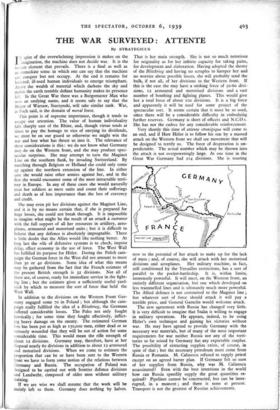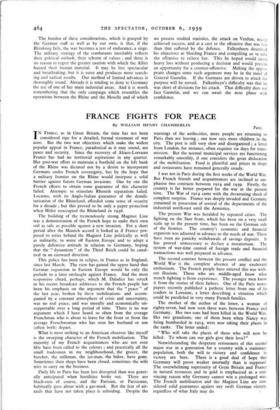THE WAR SURVEYED: ATTENTE
By STRATEGICUS F spite of the overwhelming impression it makes on the I imagination, the machine does not decide war. It is the element that prevails. There is a final as well as an immediate sense in which one can say that the machine can conquer but not occupy. At the end it remains for battered, ill-used human individuals to emerge triumphant. Above the wealth of material which darkens the sky and makes the earth tremble defiant humanity makes its presence fel:. In the Great War there was a Burgomaster Max who won an undying name, and it seems safe to say that the Mayor of Warsaw, Starzynski, will take similar rank. War, as Foch said, is the domain of moral force.
This point is of supreme importance, though it tends to escape our attention. The value of human individuality falls sharply east of the Rhine, and, though virtue tends at times to pay the homage to vice of envying its dividends, we must be on our guard or otherwise we might win the war and lose what has thrust us into it. The relevance of these considerations is this: we do not know what Germany may do on the Western front, and she may produce spec- tacular surprises. She may attempt to turn the Maginot Line on the southern flank, by invading Switzerland. By marching through Belgium or Holland she could only come up against the northern extension of the line. In either case she would raise other armies against her, and in the first she would encounter some of the most intractable terri- tory in Europe. In any of these cases she would naturally treat her soldiers as mere units and count their sufferings and death as of less importance than the loss of currency and credit.
She may even pit her divisions against the Maginot Line, and it is by no means certain that, if she is prepared for huge losses, she could not break through. It is impossible to imagine what might be the result of an attack a outrance with the full support of all her resources in artillery, aero- planes, armoured and motorised units ; but it is difficult to believe that any defence is absolutely impregnable. There is little doubt that the Allies would like nothing better. At long last the role of defensive systems is to check, impose delay, effect economy in the use of force. The West Wall has fulfilled its purpose for Hitler. During the Polish cam- paign the German force in the West did not amount to more than 3o or 4o divisions. Some idea of what this means may be gathered from the fact that the French estimate of the present British strength is 32 divisions. Not all of these are, of course, ready for immediate service in the fight- ing line ; but the estimate gives a sufficiently useful yard- stick by which to measure the sort of force that held the West Wall.
In addition to the divisions on the Western Front Ger- many engaged some 70 in Poland ; but although the cam- paign really fulfilled the idea of a Blitzkrieg, the Germans suffered considerable losses. The Poles not only fought heroically ; for some time they fought effectively, inflict- ing heavy damage on the enemy. The estimated German loss has been put as high as 150,000 men, either dead or so seriously wounded that they will be out of action for some considerable time. This would mean the rifle strength of about 12 divisions. Germany may, therefore, have at her fisposal. nearly 6o divisions in addition to about 12 armoured and motorised divisions. When we come to estimate the proportion that can be or have been sent to the Western front we have to form some notion of the relations between Germany and Russia. The occupation of Poland was designed to be carried out with frontier defence divisions and Landwehr, composed of older men without military wining If we are wise we shall assume that the work will be mainly left to them. Germany does nothing by halves. That is her main strength. She is not so much notorious for originality as for her infinite capacity for taking pains, for development and elaboration. Having adopted the theory of the Blitzkrieg and having no scruples to hamper her and no worries about possible losses, she will probably send the bulk, if not all, of her divisions to the Western front. If this is the case she may have a striking force of 50-60 divi- sions, 12 armoured and motorised divisions and a vast number of bombing and fighting planes. This would give her a total force of about too divisions. It is a big force and apparently it will be used for some project of the spectacular sort. It seems certain that it must be so used, since there will be a considerable difficulty in embodying further reserves. Germany is short of officers and N.C.O.s. She has not the cadres for any considerable reinforcement.
Very shortly this time of attente strategique will come to an end, and if Herr Hitler is to follow his star by a massed attack on the Western front we shall see movement that will be designed to terrify us. The force of desperation is un- predictable. The actual number which may be thrown into the attack is not overpoweringly large. At one time in the Great War Germany had 214 divisions. She is trusting now to the potential of her attack to make up for the lack of mass ; and, of course, she will attack with her motorised divisions and aeroplanes. Her military machine, in fact, still conditioned by the Versailles restrictions, has a sort of parallel to the pocket-battleship. It is, within limits, immensely powerful. It will meet, on the Western front, an entirely different organisation, but one which developed on less trammelled lines and is ultimately much more powerful. The Allied defence is not committed to the Maginot line ; but whatever sort of force should attack it will pay a terrible price, and General Gamelin would welcome attack.
The new agreement with Russia has changed very little. It is very difficult to imagine that Stalin is willing to engage in military operations. He appears, indeed, to be using Hitler's own technique and gaining his victories without war. He may have agreed to provide Germany with the necessary war materials, but of many of the most important requirements for war neither Russia nor any of the terri- tories so far seized by Germany has any exportable surplus. The possibility of extracting supplies exists, of course, in spite of that ; but the necessary petroleum must come from Russia or Rumania M. Calinescu refused to supply petrol except on an agreed barter plan. If Germany felt so sure of her supplies from Russia, why was M. Calinescu assassinated? Even with the best intentions in the world how can Russia speedily supply the great quantities re- quired? Pipelines cannot be-constructed, but can be inter- rupted, in a moment ; and there is none at present. Transport is not the greatest of Russian achievements. The burden of these considerations, which is grasped by the German staff as well as by our own, is that, if the Blitzkrieg fails, the war becomes a test of endurance, a siege. The military strategy of the combatants inevitably reflects their political outlook, their scheme of values ; and there is no reason to regret the greater caution with which the Allies hazard their human material. It may be less spectacular and breathtaking, but it is surer and produces more search- ing and radical results. Our method of limited advances is thoroughly sound. Already it is tending to deny to Germany the use of one of her main industrial areas. And it is worth remembering that the only campaign which resembles the operations between the Rhine and the Moselle and of which we possess studied statistics, the attack on Verdun, nearly achieved success, and at a cost to the offensive that was less than that suffered by the defence. Falkenhayn described his objectives as bleeding France and compelling us to take the offensive to relieve her. This he hoped would cause heavy loss without producing a decision and would present an opportunity for a counter-offensive. Making the appro- priate changes some such argument may be in the mind of General Gamelin. If the Germans are driven to attack his purpose will be served. Falkenhayn's difficulty was that he was short of divisions for his attack. That difficulty does not face Gamelin, and we can await the next phase with confidence.



































 Previous page
Previous page